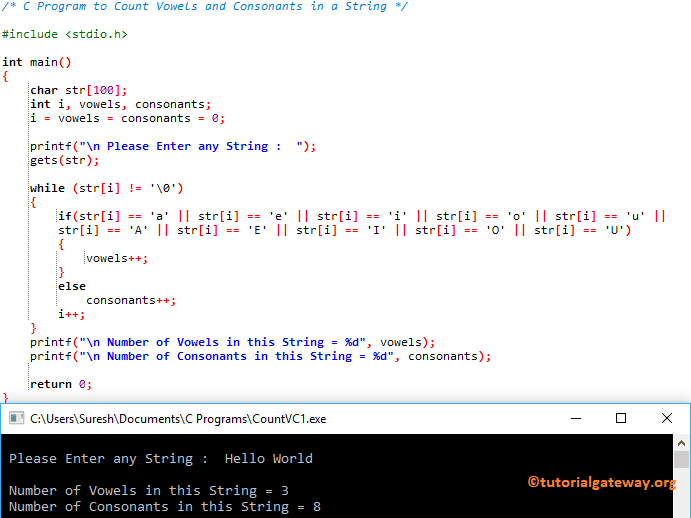如何编写一个C语言程序来计算字符串中的元音和辅音,并附带示例?
C 语言字符串中元音和辅音计数示例 1
此程序允许用户输入一个字符串(或字符数组)。然后,它将使用 If Else 语句计算用户指定字符串中存在的元音和辅音的数量。
/* C Program to Count Vowels and Consonants in a String */
#include <stdio.h>
int main()
{
char str[100];
int i, vowels, consonants;
i = vowels = consonants = 0;
printf("\n Please Enter any String : ");
gets(str);
while (str[i] != '\0')
{
if(str[i] == 'a' || str[i] == 'e' || str[i] == 'i' || str[i] == 'o' || str[i] == 'u' ||
str[i] == 'A' || str[i] == 'E' || str[i] == 'I' || str[i] == 'O' || str[i] == 'U')
{
vowels++;
}
else
consonants++;
i++;
}
printf("\n Number of Vowels in this String = %d", vowels);
printf("\n Number of Consonants in this String = %d", consonants);
return 0;
}

首先,我们使用 While 循环 遍历字符串中的每个字符。
while (str[i] != '\0')
{
接下来,我们使用 If Else 语句 来检查每个字符是否等于 a、e、i、o、u、A、E、I、I、O。如果为 TRUE,则为元音,否则为辅音。
您可以使用 strlwr 或 strupr 将所有字符转换为相同的大小写。然后,在 C 编程 If 条件中检查小写或大写字母。
if(str[i] == 'a' || str[i]== 'e' || str[i] == 'i' || str[i] == 'o' || str[i] == 'u' ||
str[i] == 'A' || str[i] == 'E' || str[i] == 'I' || str[i] == 'O' || str[i] == 'U') {
vowels++;
}
str[] = Hello World
i = 元音 = 辅音 = 0
While 循环第一次迭代: while (str[ i ] != 0)
条件为 True,因为 str[0] = H。
在 While 循环内部,我们使用 If Else 语句 来检查它是元音还是辅音。
if(str[i] == ‘a’ || str[i]== ‘e’ || str[i] == ‘i’ || str[i] == ‘o’ || str[i] == ‘u’ || str[i] == ‘A’ || str[i] == ‘E’ || str[i] == ‘I’ || str[i] == ‘O’ || str[i] == ‘U’)
=> if(H == ‘a’ || H== ‘e’ || H== ‘i’ || H== ‘o’ || H== ‘u’ || H == ‘A’ || H == ‘E’ || H == ‘I’ || H == ‘O’ || H == ‘U’)
上述条件为假。因此,它将执行 Else 块内的语句。
consonants++. 这意味着 consonants = 1
第二次迭代: while (str[ 1 ] != 0)
条件为 TRUE,因为 str[1] = e。
if(e == ‘a’ || e == ‘e’ || e == ‘i’ || e == ‘o’ || e == ‘u’ || e == ‘A’ || e == ‘E’ || e == ‘I’ || e == ‘O’ || e == ‘U’)
上述条件为 TRUE。因此,它将执行此块内的语句。
vowels++. 这意味着 vowels = 1
对于其余迭代执行相同操作
C 语言字符串中元音和辅音计数示例 2
此 程序 允许用户输入任何字符串值,并使用 ASCII 值 计算此字符串中的元音或辅音数量。
/* C Program to count vowels and consonants in a String */
#include <stdio.h>
int main()
{
char str[100];
int i, vowels, consonants;
vowels = consonants = 0;
printf("\n Please Enter any String : ");
gets(str);
for(i = 0; str[i] != '\0'; i++)
{
if(str[i] == 97 || str[i] == 101 || str[i] == 105 || str[i] == 111 || str[i] == 117 ||
str[i] == 65 || str[i] == 69 || str[i] == 73 || str[i] == 79 || str[i] == 85)
{
vowels++;
}
else
consonants++;
}
printf("\n Number of Vowels in this String = %d", vowels);
printf("\n Number of Consonants in this String = %d", consonants);
return 0;
}
Please Enter any String : Tutorial Gateway
Number of Vowels in this String = 7
Number of Consonants in this String = 9C 语言字符串中元音和辅音计数示例 3
此 C 语言元音和辅音计数程序与第一个示例相同,但这次我们使用了 函数 的概念来分离逻辑。
/* C Program to count vowels and consonants in a String */
#include <stdio.h>
int check_vowel(char);
int main()
{
char str[100];
int i, vowels, consonants;
vowels = consonants = 0;
printf("\n Please Enter any String : ");
gets(str);
for(i = 0; str[i] != '\0'; i++)
{
if(check_vowel(str[i]))
{
vowels++;
}
else
consonants++;
}
printf("\n Number of Vowels in this String = %d", vowels);
printf("\n Number of Consonants in this String = %d", consonants);
return 0;
}
int check_vowel(char c)
{
if (c >= 'A' && c <= 'Z')
c = c + 32;
if (c == 'a' || c == 'e' || c == 'i' || c == 'o' || c == 'u')
return 1;
return 0;
}
Please Enter any String : hello everyone
Number of Vowels in this String = 6
Number of Consonants in this String = 8C 语言字符串中元音和辅音计数示例 4
在此 程序 中,我们使用 Switch case(Else If 的替代方法)来计算元音和辅音。
/* C Program to count vowels and consonants in a String */
#include <stdio.h>
int main()
{
char str[100];
int i, vowels, consonants;
vowels = consonants = 0;
printf("\n Please Enter any String : ");
gets(str);
for(i = 0; str[i] != '\0'; i++)
{
if( (str[i] >= 'a' && str[i] <= 'z') || (str[i] >= 'A' && str[i] <= 'Z') )
{
switch(str[i])
{
case 'a':
case 'e':
case 'i':
case 'o':
case 'u':
case 'A':
case 'E':
case 'I':
case 'O':
case 'U':
vowels++;
break;
default:
consonants++;
}
}
}
printf("\n Number of Vowels in this String = %d", vowels);
printf("\n Number of Consonants in this String = %d", consonants);
return 0;
}
Please Enter any String : learn c programming
Number of Vowels in this String = 5
Number of Consonants in this String = 12C 语言字符串中元音和辅音计数示例 5
此用于计算元音和辅音的 程序 与第一个示例相同,但这次我们使用了 指针 的概念。
/* C Program to count vowels and consonants in a String */
#include <stdio.h>
int main()
{
char str[100];
char *s = str;
int vowels, consonants;
vowels = consonants = 0;
printf("\n Please Enter any String : ");
gets(str);
while (*s)
{
if(*s == 'a' || *s == 'e' || *s == 'i' || *s == 'o' || *s == 'u' ||
*s == 'A' || *s == 'E' || *s == 'I' || *s == 'O' || *s == 'U')
{
vowels++;
}
else
consonants++;
s++;
}
printf("\n Number of Vowels in this String = %d", vowels);
printf("\n Number of Consonants in this String = %d", consonants);
return 0;
}
Please Enter any String : vowels and consonants
Number of Vowels in this String = 6
Number of Consonants in this String = 15
评论已关闭。